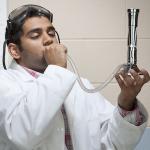What's the biggest, deadliest threat the world faces today? How a person answers that question reveals a lot about them.
science policy
The U.S. Congress is made up mostly of professional politicians and lawyers. This comes as a surprise to precisely no one, but the sheer numbers are rather striking.
A judge in California is going to determine whether or not coffee causes cancer.
I voted to legalize recreational marijuana in the State of Washington. My general belief is that adults should be allowed to do whatever they want to do, as long as they aren't harming anybody else.
Orrin Hatch, a Republican Senator from Utah, has announced his retirement. When he leaves, the Senate will lose its most ardent supporter of alternative medicine.
Scientists and lawyers do not get along. There's a reason for that. Simply put, scientists and lawyers do not think alike.
Open displays of bipartisanship are rare these days and, as such, should be applauded. Unfortunately, a recent example of bipartisanship promotes junk science and bogus health claims.
Over the past few days, a controversy has erupted following claims in the Washington Post that the Trump Administration has banned or otherwise discouraged the use of seven words, such as "fetus" and "transgender," by the CDC and other HH
A recent editorial in JAMA Marijuana, Secondhand Smoke, and Social Acceptability begins by remarking on “The cloud of secondhand marijuana smoke” vis
Like a coffee stain on a new carpet, Karl Marx stubbornly refuses to go away.












